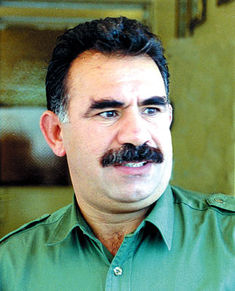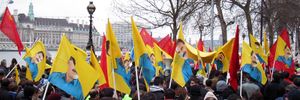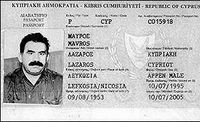Abdullah Öcalan
| Abdullah Öcalan | |
|---|---|
 Abdullah Öcalan |
|
| Born | April 4, 1948 |
| Occupation | Leader of the militant PKK |
| Political party | Kurdistan Worker's Party (PKK) |
Abdullah "Apo" Öcalan (born April 4, 1948), also known in Kurmanji as Serok Apo (Chairman Apo - the Kurdish word for uncle ), is a Kurdish leader, who founded the Kurdistan Workers' Party (PKK) in 1978. The PKK is listed as a terrorist organization by a number of states and organizations, and has been leading an armed campaign inside Turkey since 1984, with the intent of creating an independent Kurdish state. Öcalan has been imprisoned by Turkey since 1999 on İmralı Island in the Turkish Sea of Marmara.
Contents |
Biography
Abdullah Öcalan was born in Ömerli,[1] a village in Halfeti, Şanlıurfa Province, in the Eastern part of Turkey.[2] Öcalan has one brother, Osman, who was a PKK leader until defecting with several others to establish the Patriotic and Democratic Party of Kurdistan.[3]
After graduating from a vocational high school in Ankara (Turkish: Ankara Tapu-Kadastro Meslek Lisesi), Öcalan entered the Diyarbakir Title Deeds Office. In an unusual turn of events, he was relocated one month later to Bakırköy, Istanbul. Later, he entered Istanbul Law Faculty but transferred after the first year to Ankara University to study political science.[4] His return to Ankara (normally impossible given his condition[notes 1]) was facilitated by the state in order to divide a militant group, Dev-Genç. President Süleyman Demirel later regretted this decision, since the PKK was to become a much greater threat to the state than Dev-Genç.[5]
By 1973, Öcalan had organized APOCU's, a Maoist group that sought a socialist revolution in Turkey. In 1978, in the midst of the right- and left-wing conflicts which culminated in the 1980 Turkish coup d'état, Abdullah Öcalan founded the PKK, and launched a war against Turkey in order to set up an independent Kurdish state.[1][6]
Journalists Uğur Mumcu and Avni Özgürel allege that Öcalan and his first wife Kesire (not of Kurdish descent), whom he married on 24 May 1978, are members of the National Intelligence Organization (MİT).[7] Kesire's father, Ali Yıldırım, was allegedly a MİT member, too. Öcalan's pilot, Necati Kaya, was also a member of the MİT.[8] He left Turkey for Syria after the 1980 Turkish coup d'état by General Kenan Evren.[9]
Öcalan is linked to Kurdish recognition of the Armenian genocide.[10]
Turkey-PKK conflict
In 1984 the PKK initiated a campaign of armed conflict comprising attacks against government forces[11][12][13][14] in Turkey in order to create an independent Kurdish state.
PKK soon acquired a reputation as an effective force. Its violent methods have caused United States, European Union, NATO, Syria, Australia, Turkey, and some others to include the PKK on their lists of terrorist organizations.[15][16][17]
Capture and trial

Until 1998 Öcalan was based in Syria. As the situation deteriorated in Turkey, the Turkish government openly threatened Syria over its support for the PKK. As a result of this, the Syrian government forced Öcalan to leave the country, but did not turn him over to the Turkish authorities.
Öcalan went to Russia first and from there moved to various countries, including Italy and Greece. In 1998 the Turkish government requested the extradition of Öcalan from Italy. He was at that time defended by the high-profile German attorney, Britta Böhler, who argued that he fought a legitimate struggle against the oppression of ethnic Kurds. He was captured in Kenya on February 15, 1999, while being transferred from the Greek embassy to Nairobi international airport, in an operation by the Millî İstihbarat Teşkilâtı with debatable help of CIA.[19] The Greek consul who harbored him, George Costoulas, said that his life was in danger after the operation.[20]
Speaking to Can Dündar on NTV Turkey, Deputy Undersecretary of the Turkish National Intelligence Agency, Cevat Öneş, said that Öcalan impeded American aspirations of establishing a separate Kurdish state so he was handed to the Turkish authorities, who then flew him back to Turkey for trial.[21] His capture led thousands of protesting Kurds to seize Greek embassies around the world.[22][23] During the flight from Kenya to Turkey, a video recorded by Millî İstihbarat Teşkilâtı officers. Ocalan stated that his mother is Turkish origin also and he is ready to serve the people of Turkey in any way.[24]
After his capture Öcalan was held under solitary confinement as the only prisoner on the İmralı Island in the Turkish Sea of Marmara. Despite the fact that the other prisoners formerly at İmralı were transferred to other prisons, there were still over 1,000 Turkish military personnel stationed there guarding him. He was sentenced to death, but this sentence was commuted to life-long aggravated imprisonment when the death penalty was abolished in Turkey in August 2002.[25] No one has been executed in Turkey since 1984.[26] The Kurdish Human Rights Project (KHRP) may have aided this case's decision.[27]
In November 2009 the Turkish authorities announced that he would be moving to a new prison on the island and that they were ending his solitary confinement by transferring several other PKK prisoners to İmralı, and that Öcalan would be able to see them for ten hours a week. They began building the new prison after the Council of Europe's Committee for the Prevention of Torture visited the island and objected to the conditions in which he was being held. [28] [29]
In 2005, the European Court of Human Rights ruled that Turkey had violated articles 3, 5 and 6 of the European Convention of Human Rights by granting Öcalan no effective remedy to appeal his arrest and sentencing him to death without a fair trial.[30] Öcalan's request for a retrial was refused by Turkish court; in 2010, ECtHR rejected application against this refusal.[31]
Proposal for political solution
Contradicting his pre-capture policy of the use of power, Öcalan has, since his arrest in 1999, campaigned for a peaceful solution to the Kurdish conflict inside the borders of Turkey.[32][33][34][35][36] Öcalan called for the foundation of a "Truth and Justice Commission" by Kurdish institutions in order to investigate "war crimes" committed by PKK and Turkish security forces and a parallel structure began functioning in May 2006.[37] In March 2005, Abdullah Öcalan released the Declaration of Democratic Confederalism in Kurdistan[38] in which he asks for a border free confederation between the Kurdish regions of Turkey (called "Northwest Kurdistan" by Kurdish nationalists[39]), Syria ("Small part of South Kurdistan"), Iraq ("South Kurdistan"), and Iran ("East Kurdistan"). In this zone, three bodies of law would be implemented: EU law, Turkish/Syrian/Iraqi/Iranian law and Kurdish law. This perspective was included in PKK programme following the "Refoundation Congress" in April 2005.[40]
Since his incarceration he has significantly changed his ideology, reading Western social theorists like Murray Bookchin, Immanuel Wallerstein, Fernand Braudel,[41] fashioned his ideal society as "Democratic Confederalism" and refers to Friedrich Nietzsche as "a prophet".[42] He also wrote books[43] and articles[44] on the history of pre-capitalist Mesopotamia and Abrahamic religions.
Öcalan had his lawyer, Ibrahim Bilmez,[45] release a statement 28 September 2006, calling on the PKK to declare a ceasefire and seek peace with Turkey. Öcalan's statement said, "The PKK should not use weapons unless it is attacked with the aim of annihilation," and that it is "very important to build a democratic union between Turks and Kurds. With this process, the way to democratic dialogue will be also opened".[46]
On May 31, 2010 however, Öcalan said he was abandoning attempts to start dialogue between the PKK and Turkey saying that "this process is no longer meaningful or useful" and that he would leave the top PKK commanders in charge of the conflict. However, he also said that his comments should not be misinterpreted as a call for the PKK to intensify its armed conflict with the Turkish state.[47]
Current situation
In April 2009, the lawyer for Nelson Mandela visited Turkey and spoke publicly of Nelson Mandela's support for the Kurdish people's Freedom Struggle. Essa Moosa, visiting Turkey on official business, denounced the criminalisation of the Kurdish Freedom Struggle and compared Abdullah Ocalan to Nelson Mandela. Expressing Nelson Mandela's support for the Kurdish Freedom Struggle he said,"Both Mandela and Öcalan have struggled for their people!" He added that they had been arrested in similar circumstances and held on island prisons and noted that the Kurdish leader was even more isolated than Nelson Mandela had been.[48]
In 2007, lawyers acting for Öcalan, claimed to have produced results from laboratory tests on his hair which appeared to show high levels of toxic metals. The Turkish government has sent a medical team to the imprisoned Kurdish separatist leader amid these claims and the tests found no indication of toxins or abnormalities.[49][50] However, according to CPIT, some elements of toxins have been found but they have been attributed to the climate conditions of the Imrali Island which Ocalan is captivated. A ministry statement suggested the lawyers were trying to revive international interest in their client after the Council of Europe ruled the previous month that the rebel leader was not entitled to a retrial.[51] At 6. March 2008 the Committee for the Prevention of Torture declared that they didn't find any proof for an intoxication of Abdullah Öcalan.[52]
In 2008, prosecutors investigating on the nationalist Ergenekon network, accused of terrorism and of conspiracy to destabilize the nation, were interested in Öcalan's contacts while in prison. Öcalan himself asked to be heard as a witness in this case.[53] A retired intelligence officer, Bülent Orakoğlu, went so far as to accuse him of membership in the network.[54]
In December 2008, Öcalan sued Greece for 20,100 Euros in compensation for their negligence is his getting captured; his indictment specifically stated that Athens had assured him of protection. The Greek government previously rejected Turkey's criticism on support of Öcalan. Turkey also blamed Greece for supporting PKK insurgents. Greece claimed that it acted humanely and denies it has helped the rebels. Greece later granted asylum to two of Öcalan's aides.[55]
Publications
Abdullah Ocalan is the author of more than 40 books, four of which were written in prison. Many of the notes taken from his weekly meetings with his lawyers have been edited and published, notably:
- Prison Writings: The Roots of Civilisation (2007) ISBN 0745326161
- Defending a civilisation
- Sumer rahip devletlerinden demokratik uygarliga volumes 1 and 2
- Translation of his 1999 defense in court
See also
- PJAK, Iranian Kurdish militant group inspired by the philosophy of Abdullah Öcalan
Notes
- ↑ Normally, students can only transfer between like departments, otherwise the student must retake the university entrance exam. Moreover, Öcalan was awarded a scholarship by the Ministry of Finance, despite being ineligible due to his age, and the fact that he had participated in political demonstrations. He had also been tried and acquitted by a martial law court. The public prosecutor had asked for the harshest possible sentence.
References
- ↑ 1.0 1.1 Witschi, Beat (1999). "Who is Abdullah Ocalan?". CNN. Archived from the original on 2000-08-16. http://web.archive.org/web/20000816095333/http://www.cnn.com/SPECIALS/1999/ocalan/stories/ocalan.profile/. Retrieved 2008-01-11.
- ↑ "ABDULLAH ÖCALAN MI YOKSA ARTİN AGOPYAN MI?" (in Turkish). Blogcu. 2008-05-22. http://atlantisece.blogcu.com/abdullah-ocalan-mi-yoksa-artin-agopyan-mi_16780491.html. Retrieved 2009-01-15.
- ↑ Kutschera, Chris (July 2005). "PKK dissidents accuse Abdullah Ocalan". The Middle East Magazine. http://www.chris-kutschera.com/A/pkk_dissidents.htm. Retrieved 2008-12-22.
- ↑ Koru, Fehmi (1999-06-08). "Too many questions, but not enough answers". Turkish Daily News (Hürriyet). http://arama.hurriyet.com.tr/arsivnews.aspx?id=-513250. Retrieved 2008-12-22.
- ↑ Cicek, Nevzat (2008-07-31). "‘Pilot Necati’ sivil istihbaratçıymış" (in Turkish). Taraf. http://www.taraf.com.tr/haber.asp?id=13608. Retrieved 2009-01-04. "Abdullah Öcalan’ın İstanbul’dan Ankara’ya gelmesine keşke izin verilmeseydi. O zamanlar Dev-Genç’i bölmek için böyle bir yol izlendi... Kürt gençlerini Marksistler’in elinden kurtarmak ve Dev-Genç’in bölünmesi hedeflendi. Bunda başarılı olundu olunmasına ama Abdullah Öcalan yağdan kıl çeker gibi kaydı gitti. Keşke Tuzluçayır’da öldürülseydi!"
- ↑ "Kurdish leader Ocalan apologizes during trial". CNN. 1999-05-31. Archived from the original on 2002-02-06. http://web.archive.org/web/20020206141642/http://cnn.com/WORLD/meast/9905/31/ocalan.02/. Retrieved 2008-01-11.
- ↑ Yavuz, Ercan (2008-12-14). "Wolf in the fold: agents as journalists". Sunday's Zaman. http://www.sundayszaman.com/sunday/detaylar.do?load=detay&link=161191. Retrieved 2008-12-13.
- ↑ Aydin, Zulfikar Ali (2008-07-27). "PKK-MİT ilişkisini yazamadan öldürüldü" (in Turkish). Sabah. http://arsiv.sabah.com.tr/2008/07/27/haber,C914C4AAA7BD444986DAC26DCD7BAA69.html. Retrieved 2008-12-19.
- ↑ "Hate-figure and hero". BBC News. 2000-11-21. http://news.bbc.co.uk/2/hi/europe/213964.stm.
- ↑ Öcalan's letter to Kocharian
- ↑ Ministry of Foreign Affairs (Turkey), The Workers' Party of Kurdistan (PKK), Federation of American Scientists
- ↑ Letter to Italian Prime Minister Massimo D'Alema, Human Rights Watch, November 21, 1998
- ↑ Turkey: No security without human rights Amnesty International, October 1996
- ↑ Special Report: Terrorism in Turkey Ulkumen Rodophu, Jeffrey Arnold and Gurkan Ersoy, February 6, 2004
- ↑ Foreign Terrorist Organizations U.S. Department of State, March 27, 2002
- ↑ PKK & TERRORISM: A Report on the PKK and Terrorism
- ↑ Turco-Syrian Treaty, October 20, 1998
- ↑ "TURKISH PROPAGANDA AGAINST CYPRUS IS REJECTED". United Nations. February 24, 1999. http://www.un.int/cyprus/pr240299.htm. Retrieved 2008-02-22.
- ↑ Weiner, Tim (1999-02-20). "U.S. Helped Turkey Find and Capture Kurd Rebel". New York Times. http://query.nytimes.com/gst/fullpage.html?res=9E03E3D8143DF933A15751C0A96F958260. Retrieved 2007-12-15.
- ↑ Ünlü, Ferhat (2007-07-17). "Türkiye Öcalan için Kenya'ya para verdi" (in Turkish). Sabah. http://www.sabah.com.tr/2007/07/17/haber,025EFB746B684ED8B16B1759BE71DE6F.html. Retrieved 2008-12-18.
- ↑ "Öcalan bağımsız devlete engeldi" (in Turkish). Vatan. 2008-10-15. http://haber.vatanim.com.tr/haberdetay.asp?detay=Kurt_sorununun_cozumu_teroru_bitirir_203724_1&Newsid=203724. Retrieved 2008-10-15. "Öcalan yakalandığında ABD, bağımsız bir devlet kurma isteğindeydi. Öcalan, konumu itibariyle, araç olma işlevi bakımından buna engel bir isimdi. ABD bölgede yeni bir Kürt devleti kurabilmek için Öcalan’ı Türkiye’ye teslim etti."
- ↑ Kurds seize embassies, wage violent protests across Europe CNN.com, February 17, 1999
- ↑ Yannis Kontos, Kurd Akar Sehard Azir, 33, sets himself on fire during a demonstration outside the Greek parliament in central Athens,Greece on Monday, February 15, 1999. Photostory, July, 1999
- ↑ Apo'nun yakalanisi Youtube.com, March 03, 2009
- ↑ "Text of the Ocalan verdict". BBC News. 29 June 1999. http://news.bbc.co.uk/1/hi/world/monitoring/380845.stm. Retrieved 2008-01-11.
- ↑ "Turkey delays execution of Kurdish rebel leader Ocalan". CNN. January 12, 2000. Archived from the original on 2006-05-26. http://web.archive.org/web/20060526031932/http://archives.cnn.com/2000/WORLD/meast/01/12/ocalan.01/. Retrieved 2008-01-11.
- ↑ "Kurdish Human Rights Project". http://www.khrp.org.
- ↑ Villelabeitia, Ibon (2009-11-18). "Company at last for Kurdish inmate alone for ten years". The Scotsman. http://thescotsman.scotsman.com/world/Company-at-last-for-Kurdish.5833050.jp. Retrieved 2009-11-27.
- ↑ Erduran, Esra (2009-11-10). "CoTurkey building new prison for PKK members". Southeast European Times. http://www.setimes.com/cocoon/setimes/xhtml/en_GB/features/setimes/features/2009/11/10/feature-02. Retrieved 2009-11-27.
- ↑ ECtHR Grand Chamber judgment in case 46221/99
- ↑ Press release of ECtHR, 16.07.2010.
- ↑ REPORT AND RECOMMENDATIONS ON THE KURDISH QUESTION IN TURKEY by the international delegation of human rights lawyers, January 1997
- ↑ Interview with Abdullah Ocalan "Our First Priority Is Diplomacy" Middle East Insight magazine, January 1999
- ↑ Kurdistan Turkey: Abdullah Ocalan, The End of a Myth? The Middle East magazine, February 2000
- ↑ Abdullah Öcalan proposes 7-point peace plan Kurdistan Informatie Centrum Nederland
- ↑ van Bruinessen, Martin. Turkey, Europe and the Kurds after the capture of Abdullah Öcalan 1999
- ↑ Öldürülen imam ve 10 korucunun itibarı iade edildi, ANF News Agency, May 30, 2006.
- ↑ "PKK ilk adına döndü" (in Turkish). Hürriyet. 2009-01-09. http://webarsiv.hurriyet.com.tr/2005/04/04/622724.asp. Retrieved 2009-01-09.
- ↑ PKK Program (1995) Kurdish Library, January 24, 1995
- ↑ PKK Yeniden İnşa Bildirgesi PKK web site, April 20, 2005
- ↑ Tarihli Görüşme Notları PWD-Kurdistan, March 16, 2005
- ↑ Öcalan: Diyarbakır olayları boşanmanın ilanıdır ANF News Agency, May 20, 2006
- ↑ "abdullah-ocalan.com". http://www.abdullah-ocalan.com/index1.htm.
- ↑ "Rayedarên tirk mafên Rêberê KCK'ê Abdullah Ocalan gasp dikin". http://www.denge-mezopotamya.com/besataybet/news_detail.asp?newsid=-769564977&pg=1. Retrieved 2008-01-11.
- ↑ Kurdish leader calls for cease-fire NewsFlash
- ↑ Kurdish rebel boss in truce plea, BBC News
- ↑ http://www.hurriyetdailynews.com/n.php?n=pkk-steps-up-attacks-in-turkey-2010-05-30
- ↑ Mandela and Ocalan. Both Jailed for Fighting for the Freedom of their People!
- ↑ A medical report says "no toxins", HaberX'.
- ↑ Rainsford, Sarah (6 March 2007). "Turkish medics to examine Ocalan". BBC News. http://news.bbc.co.uk/1/hi/world/europe/6422351.stm. Retrieved 2008-01-11.
- ↑ Rainsford, Sarah (1 March 2007). "Inquiry into Ocalan 'poisoning'". BBC News. http://news.bbc.co.uk/2/hi/europe/6410273.stm. Retrieved 2008-01-11.
- ↑ "Addendum to the report on the visit to Turkey carried out by the European Committee for the Prevention of Torture and Inhuman or Degrading Treatment or Punishment (CPT)" (PDF). CPT. 6 March 2008. http://www.cpt.coe.int/documents/tur/2008-13-inf-addendum-eng.pdf. Retrieved 2008-03-06.
- ↑ Ergenekon indictment reopens gendarmerie major’s murder case, Today's Zaman, 13 August 2008
- ↑ Soncan, Emre (2008-10-10). "PKK'nın elebaşısı Ergenekon üyesiydi" (in Turkish). Zaman. http://www.zaman.com.tr/haber.do?haberno=648841&title=bpkknin-elebasisi-ergenekon-uyesiydib. Retrieved 2008-10-10.
- ↑ "Terrorist PKK leader Ocalan sues Greece over Turkish capture". Hurriyet English. 2008-12-05. http://www.hurriyet.com.tr/english/world/10511159.asp?gid=244. Retrieved 2008-12-05.
Further reading
- Özcan, Ali Kemal (2005). Turkey's Kurds: A Theoretical Analysis of the PKK and Abdullah Ocalan. London & New York: Routledge. ISBN 0-415366-87-9.
External links
- Special report: The Ocalan file, BBC News, November 26, 1999.
